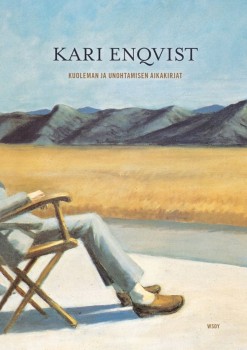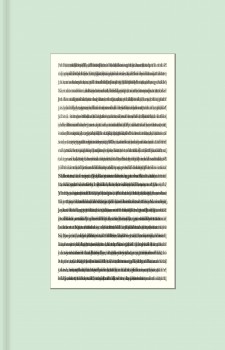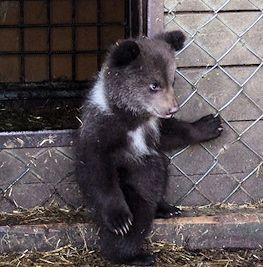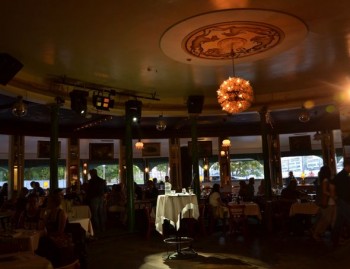Search results for "2010/02/let-us-eat-cake"
In the detail?
11 December 2009 | Essays, Non-fiction
 Extracts from Kuoleman ja unohtamisen aikakirjat (‘Chronicles of death and oblivion’, WSOY, 2009)
Extracts from Kuoleman ja unohtamisen aikakirjat (‘Chronicles of death and oblivion’, WSOY, 2009)
What’s the meaning of life? There are those who seek it in religion, while for others that is the last place to look. The scientist Kari Enqvist ponders why some people, including himself, seem physiologically immune to the lure of faith. Perhaps, he suggests, we should look for significance not in the big picture, but in the marvel of the fleeting moment
As a young boy I must have held religious beliefs. However, I cannot pinpoint exactly when they disappeared. At some point I eventually stopped saying my evening prayers, but I am unable to remember why or when this happened. ‘I was born in a time when the majority of young people had lost faith in God, for the same reason their elders had had it – without knowing why,’ writes the Portuguese poet Fernando Pessoa in The Book of Disquiet. More…
Within the mirror
 An extract from Kivirivit (‘Stone lines’, Otava, 2013). Introduction and commentary, Writing silence,
An extract from Kivirivit (‘Stone lines’, Otava, 2013). Introduction and commentary, Writing silence,
by Mervi Kantokorpi
Then, not now. White birches against the white
sky. A vase in the middle of the room.
An attempt to make contact, but with what? The room slowly
fills with whisper and touch. A woman,
turning to catch herself in the mirror,
is afraid the phone will start ringing and startle
her. A gap-closer, not an equaliser.
Beneath the bridges, faces around the fire, these, those. More…
Cute or what!
28 November 2013 | This 'n' that

A bear pose: a small bear at the Kuusamo Predator Centre. Photo: Pasi Jäntti
Beardom is a weird, fascinating universe. We admit we have a soft spot for this furry predator, living in Finnish forests, which hibernates during the coldest months and does not eat humans (if it can possibly avoid it).
Take a look at these cuties: the New York Daily News published bear photos by a Finnish photographer on 21 November. This smash hit in bear photography is the series in which Valtteri Mulkahainen, an amateur photographer and teacher living in Sotkamo, north-eastern Finland, managed to capture a bear family in Suomussalmi last summer. Adorable creatures!
These lively triplets seem to be playing a round game while their mummy keeps on eating nearby. We hope they will live happily ever after, and that they found a good home for their winter sleep.
The estimate of the number of brown bears in the country is around 1,300. One hundred and thirty two shooting licences were issued this year. Bears in winter hibernation are strictly protected from hunting.
More bears, from the Kuusamo Predator Centre, also north-eastern Finland, on our page (and more of Valtteri Mulkahainen’s photos can be viewed on 500px.com)!
Tiger in the grass
31 March 2001 | Fiction, Prose
Extracts from the novel Maan ääreen (‘To the end of the earth’, Otava, 1999)
I left Kronstadt at the end of October in the year 1868, when I was 22 years old.
The Mozart was a three-hundred-ton barque. Even on the journey to Tvedestrand in Norway I vomited yellow bile and my toes and fingers froze. We lingered in Tvedestrand for three months while the vessel was repaired in dock. To amuse myself, I drew and wrote an accurate description of the ship. That work ended up in the sea. From the harbour captain’s library I borrowed German books which dealt with geology and topology. Their reality was different from that of the law and the interpretation of its letter and spirit. When a topologist draws a map, it has to be true. Otherwise travellers will get lost, I thought childishly, as if it were possible to draw a line between true and true. More…
Pig-Sweet
30 September 1998 | Fiction, Prose
An extract from the novel Diva. En uppväxts egna alfabet med Docklaboratorium (en bonusberättelse ur framtiden) (‘Diva. An alphabet of your own for growing up with Doll Laboratory [a bonus story from the future]’, Söderströms, 1998)
I am Diva and everything I say is true. Close your eyes, dream about the most beautiful thing of all. Open your eyes again. See me. Girl-woman. Diva-Lucia. Thirteen, nearly fourteen. Baby Wonder. The one they thought did not exist.
Squelch
(an eternal day, love is born)
Daniel and I. In the autumn we go out to a cottage in the forest. We go walking for a whole extra day. We walk and walk, and it is an autumn day which is implacable. The lingonberries glow in the sun as if on a garish work of art by an impressionist seeing the world for a moment in a sickly way, sweat running inside boots, and squelch squelch on dry crackling ground, so it feels as if the whole forest would be shattered under your boot-clad feet. Great black boots, certainly two sizes too large so as to allow for a proper squelch. Or to allow something. A dry dry autumn, Daniel admits metres ahead of me. And that the elk-flies can’t have had time to get here from across the eastern border beyond which, as far as I know, they exist; it will take years before they manage to get here, Daniel explains. I squelch on, however much those creepy-crawlies are undeniably creeping over my body under my hot tracksuit, in my hair and scalp. Daniel knows about the forest and nature. Daniel knows about everything. And he laughs again because of those flies, and later, he laughs at night, for they don’t stop crawling then either, in the sleeping-bag which in a special way attaches me to Daniel because the zip has stuck and has to be nibbled apart by my teeth, for by then Daniel is asleep, and I have to get out and spew, for I have eaten the wrong things in the wrong order, as so often, all at once, I mean. So Daniel does not believe me. We walk on. More…
Talking to Andrei
30 June 1998 | Fiction, poetry
Poems from Efter att ha tillbringat en natt bland hästar (‘After spending a night among horses’, Söderströms, 1997)
The snow is whirling over the roses of the inner courtyard
The snow is whirling over the roses of the inner courtyard.
Did not bring boots or scarf with me, leaf
through books, don’t know what to do with all this light!
You would not approve of the colours.
It’s too impressive, Andrei Arsenyevich, there is too
much, too much of everything!
You swapped your wings for an air balloon, a clumsy
contraption twined together from ropes and rags, I remember it well.
Earlier, I had a lot and didn’t remember. Hard
to keep to the point. Hard to keep to the point.
Hope to get back. Hope to get back to the principle
of the wings. Fact remains: the cold preserved
the rose garden last night. ‘The zone is a zone, the zone is life,
and a person may either perish or survive as
he makes his way through this life. Whether he manages it or
not depends on his sense of own worth.’* A hare
almost leapt into the vestibule here at the Foundation,
mottled against the snow; in the hare’s diary it’s October, after all.
You seem to be in quite a malignant humour,
and it is possible that none of this interests you.
On the other hand, you quite often complain yourself.
I’m writing because you are dead and because I woke up
last spring in my hotel facing the street in Benidorm to that wonderful
high twittering. One ought not to constantly say sorry, one ought
not to constantly say thank you, one ought to say thank you. Lake Mälaren like lead down there. The rest is white and red. More…
Family mysteries
31 March 2003 | Archives online, Fiction, poetry
Extracts from Einen keittiö, Eines kök (‘Eine’s kitchen’, Tammi, 2002). Introduction by Satu Koskimies
This sort of detached block of flats is as much of a living organism
as the folk dwelling in it.
For above are the brains and below are the intestines and outlets.
The upper floors were flaunting their kitchen taps, sink-tops,
lion-clawed sofas, mahogany chests and
sapphire-pendant crystal chandeliers, flashing the violet-tones of sea and
rain. More…
The daughter
A short story from Meddelande (‘Messages’, Schildts, 1998)
Mother, hello! It’s me … can’t hear you very well. I rang a while ago, but maybe you were having your nap?
(Cheerfully) Yes, of course, you can take a nap whenever you like. I can always phone back.
But Mother, listen to what I’m saying now: that’s the last thing I want you to do. It’s awful if you’re just sitting there by the phone, waiting and waiting. You mustn’t do that. I can phone later when I phone, you know that. How’re things?
But that’s good. Great. And you’ve made your evening cup of tea? More…
The summer of 1965
30 June 1995 | Archives online, Fiction, Prose
From Underbara kvinnor vid vatten (‘Wonderful Women by the Sea’, Söderströms, 1994; Finnish translation lhanat naiset rannalla, Otava, 1995). Introduction by Michel Ekman
The summer of 1965; this summer people go waterskiing. They go waterskiing behind the Lindberghs’ shining mahogany sportsboat, and from midsummer onwards they go water-skiing behind Gabbe’s outboard motorboat, an Evinrude bought second-hand from Robin Lindbergh. Now Bella and Rosa are skiing: Tupsu Lindbergh’s face is covered in freckles if you look at her close to, and it’s not particularly becoming, her fair hair is super-peroxided and she is as thin as a skeleton and everyone knows that it’s because she is so thin and ugly and not because she has a cold that she says she can’t take part in any watersports. There is something nervous about Tupsu Lindbergh. At Bella’s party at the beginning of the summer Tupsu Lindbergh sits on the white villa’s veranda, on the white villa’s lawn on a camping chair, on the white villa’s beach while Bella and Rosa go waterskiing and talk about Tupperware. Not Tupperware all the time, but Tupperware is the collective description. More…
A long dream
9 October 2009 | Fiction, Prose
A short story from Jälkikasvu (‘Offspring’, Otava, 2009)
‘I was eating a late breakfast, without a care in the world, when it happened.’
He snaps off the recorder. He has said the same thing three times now, but he always loses his train of thought right there. Why is it so difficult to continue? In his mind, the next part feels quite clear, but the words simply won’t come out of his mouth. He ought to say that his wife left him yesterday, on the twelfth of February, at 10:48 AM, following a three-minute fifteen-second briefing. More…
Dark, cold – yet happy?
27 August 2010 | This 'n' that
 In the fields of education, health, quality of life, economic dynamism and political environment, the best country in the world is… Finland.
In the fields of education, health, quality of life, economic dynamism and political environment, the best country in the world is… Finland.
According to the American Newsweek magazine (August 15), Finland is now the best place to live – if you appreciate the factors of life mentioned above. On the list of a hundred countries, Switzerland and Sweden were numbers two and three. More…
Night of the Living….
5 September 2013 | In the news

Poetry in focus: Kaisaniemi Restaurant, Helsinki, 24 August. Photo: Irene Dimitropoulos
…Poets was the main event of the annual literature festival Runokuu, Poetry Moon, taking place on 24 August in a Helsinki restaurant. The theme was the sea: the invited guests were from around the Baltic Sea – as well as beyond.
The Poetry Moon festival is organised by Nuoren Voiman Liitto and Helsinki Festival, now for the ninth time, with more than 30 events taking place in the city between 22 and 28 August.
‘In four hours writers and languages kept changing fast,’ reports Irene Dimitropoulos, an intern at FILI (Finnish Literature Exchange): ‘You had to throw yourself into the rhythms and sounds of languages both familiar and strange.
‘The programme contained lots of poetry, but the short story and non-fiction were also included. The idea of the literary evenings is to meet with writers from abroad and also to support translated foreign poetry, as very little gets translated into Finnish, so translators perform with poets.
‘The stylistic and thematic variations of different generations of writers were introduced in many ways. A translation of I Am Going to Clone Myself Then Kill the Clone and Eat It [2009/2012] by the American poet Sam Pink was published in Finnish earlier this year: his style, both simple and strikingly comical, and the way he depicts everyday experiences and the violent fantasies they invoke, made the audience laugh. Crowds were also drawn to listen to the Finnish novelist Monika Fagerholm and the German poet and translator Ulrike Draesner; Fagerholm read from her book of lyrical essays on the sea, Draesner her poems dealing with womanhood and the interaction between language and body.’
Among the other poets were Peeter Sauter and Maarja Kangro from Estonia, Igor Belov and Irina Maksimova from Russia and Toh Hsien Min from Singapore.
